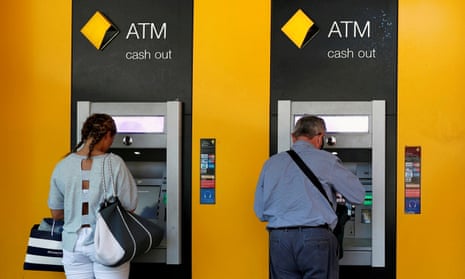The federal government should take action to force banks to reimburse scam victims and check the account details match up on transactions to stop scams before the money is lost, consumer rights advocates say.
The call comes as Australia’s big four banks pushed back on mandatory reimbursements, arguing they could “inadvertently lead to increases in scam activity” and that customers should keep themselves safe.
The federal government has already pushed back on mandatory reimbursements, with the assistant treasurer, Stephen Jones, previously saying it would “create a honey pot” for scammers and that he expects the banks to take the best approach to keep customers safe.
Last week the Commonwealth Bank introduced NameCheck technology, meaning the bank will check the account details match up on all transactions. Launching in late March, the technology will help reduce false billing scams as well as mistaken payments.
Sign up for Guardian Australia’s free morning and afternoon email newsletters for your daily news roundup
In 2019 six of the UK’s biggest banks adopted a similar technology, called Confirmation of Payee, which led to a 35% fall in the amount of money lost because of misdirected payments.
The policy officer at the Consumer Action Law Centre, Tom Abourizk, said the government could easily mandate that all four banks adopt technology that checks the name and account are right before transferring the money.
“For months, banks told us the investment would be too heavy to do it, and it wasn’t worth it, but CBA have shown that wasn’t true,” Abourizk said.
“That’s one thing the government could mandate, that banks have to introduce a confirmation of payee. That happens with PayID transfers, but introducing it on all transfers is something they could do to help.”
In September last year, Bill Hall, 76, lost $20,000 within minutes after a scammer intercepted an invoice from his builder and changed the account details. Afterwards, the banks realised the name and numbers did not match up – but it was too late.
Hall said he received a notification from one bank’s fraud department saying that a different bank was concerned “because the name for the account did not match the name on the funds’ transfer”, Hall said.
The banks were able to get $6,000 back but the rest was already gone. Hall contacted the Australian Financial Complaints Authority but was told it could not investigate because the transfer was between different banks.
“It’s so simple. The bank needs to compare the account name and the account number [when it’s transferred],” Hall said. “That’s how they found it in the first place that there was a problem.”
Both the Consumer Action Law Centre and Choice are also advocating for the government to force banks to offer reimbursements – as they do in the UK.
Australian consumers and businesses lost more than $2bn to scams in 2021, according to the Australian Competition and Consumer Commission.
after newsletter promotion
In the same year financial institutions told the ACCC that they prevented or recovered nearly $341m from scammers. In addition, they also refunded almost $103m to customers who were victims of scams – this was up $49m from 2020.
When asked if Commonwealth Bank would support mandatory reimbursements, the bank echoed the federal government’s position.
“The government has highlighted they want to avoid any approach that might inadvertently lead to increases in scam activity in Australia,” the spokesperson said.
“We agree this is an important consideration when looking at different liability models that have been adopted overseas.”
Westpac said scams took place in scenarios where customers have actively participated and willingly transferred money and NAB argued “customers play a critical role” in protecting themselves.
Patrick Veyret, head of policy at Choice said “Australia had fallen behind best practice”, with countries like the UK.
“As a starting point, banks should be required to adopt confirmation of payee technology,” he said.
“Banks should also be required to reimburse their customers where they fail to stop scammers from obtaining customers’ money via their payment platforms. This will create better incentives for banks to invest in the right systems and technology to protect consumers.”
